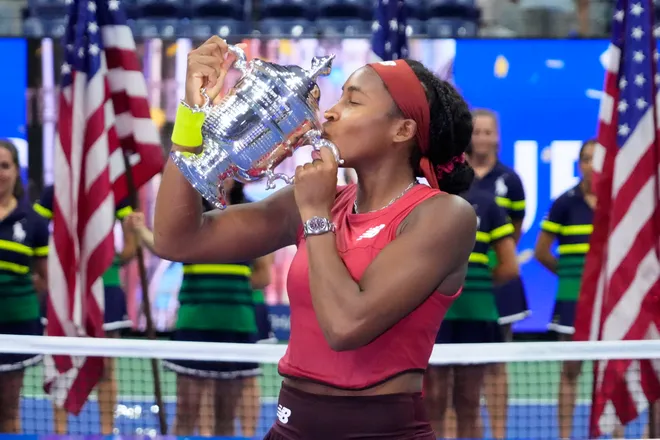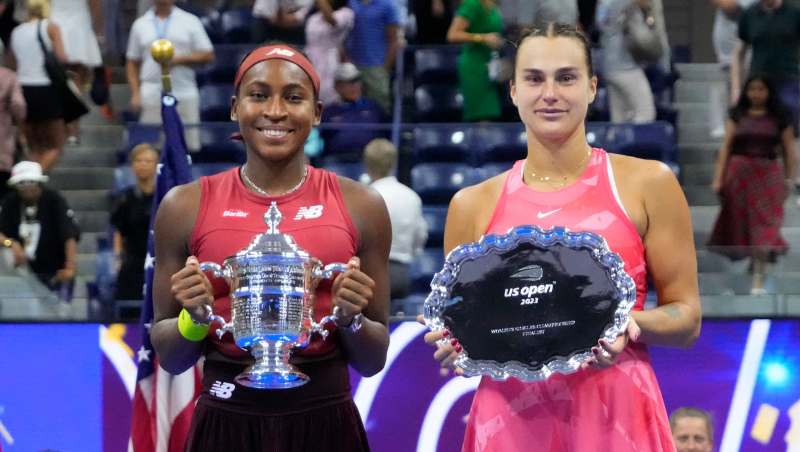Coco Gauff's maturity, slow-and-steady climb pays off with first Grand Slam title
NEW YORK — Impressive as it is, winning the US Open as a 19-year-old doesn’t quite tell the right story about who Coco Gauff is.
It’s obvious you’re a champion when you’re holding the silver trophy, as she did under the roof of Arthur Ashe Stadium on Saturday night after all the tearful embraces, a phone call from her brother and a prayer to up above as her body shook with adrenaline. It’s not so easy to see when the entire world thinks you’re getting passed by your peers.
And two years ago, at this very tournament, that seemed like it might be happening. Gauff was 17 then, a child playing against grown-ups week in and week out, going through the types of things that would never cause any alarm if she wasn’t already quite famous and being propped up as the future of women’s tennis.
GAUFF: Takes the reins of her tennis career, but her parents remain biggest supporters
She crashed out in the second round, losing 6-4, 6-2 to Sloane Stephens, a result that probably should have been expected against a former US Open champion. But as the tournament went on, Gauff’s struggle to contend for Grand Slam titles started to look different when two other teenagers made the final.
Though 18-year old Emma Raducanu and 19-year old Leylah Fernandez were Gauff’s contemporaries, they started that tournament far behind her in career accomplishments and rankings. Suddenly, after an amazing two-week run, they had leapfrogged her.
In an individual sport like tennis that is rife with jealousies and personal rivalries, where the top prospects often grow up competing against each other and measuring against each other for years before they become pros, that couldn’t have been easy for Gauff to see the advantage she had built over her peers disappear.
But when I asked her how she processed that, her response at the time blew me away.
“I definitely don’t measure myself by them,” Gauff said. “I just don’t do that because we’re all different, we're all going ot have our time to shine at some point. It definitely is inspiring because we’ve all been close in level for a long time. I feel like I can make it to semis, finals because they’re doing it. I'm always going to root for my age group just because we're all kind of friends and we’re all rooting for each other. It definitely inspires me.”
At 17, she might have already been the most mature person in the sport.
What Gauff couldn't have known then, however, was what her career would look like two years later.

Often with the historically great players who emerge as teens, it happens very fast. Serena Williams won the seventh Grand Slam she entered. Venus Williams reached the final in her third and won on her 13th try. Martina Hingis got there in her sixth, Monica Seles her fourth.
Gauff was a slower burn. This US Open was her 17th chance at a major, and not winning one had indeed begun to weigh on her.
“It was to the point where I remember I lost when I was 17 and there was a stat, they were like, ‘Oh, she's not going to win a slam before Serena's age,’” It was stuff like that that I felt like I had a time limit on when I should win one, and if I won one after a certain age it wouldn't be an achievement. I's just crazy the amount of things that I have heard or seen about myself, but I'm really happy of how I've been able to manage it all.”
US OPEN: Coco Gauff beats Aryna Sabalenka for first Grand Slam title
It is hard enough for any adult to remember what their mindset was as a teenager. The expectations on most of us in those years don’t go far beyond going to college or getting a job or being halfway decent citizens who don’t embarrass our families.
But Gauff has really known no other life than one where other people’s expectations are to become the best in the world at a brutally tough sport. And even beyond that, when a 15-year old Black girl becomes famous by beating Venus Williams at Wimbledon — right as the Williams sisters are about to ride into the sunset of their careers — there was an even higher bar for her to clear even though she wasn’t even close to a developed player.
“I wish I could give this trophy to my past self so she can be, like, all those tears are for this moment,” Gauff said.
We have seen many players go the wrong direction when the grinding reality of life as a professional tennis player and how difficult it is to win these things doesn’t match up with what they thought would happen when their careers began.
The tour is littered with cautionary tales of players who endure mental health struggles, stop winning altogether, burn out and eventually give it up when they aren’t meeting certain timelines or expectations.
But for all the disappointment Gauff endured, including losing the French Open final last year, the clarity about who she is and why she did this never wavered. At a certain point, she said, she realized life was going to be good even if the dream never quite became reality.
“There’s a lot of relief, but it’s not the biggest emotion,” she said. “I think it's honestly the smallest one, and I think that was what the difference was between French Open and now. If I would have maybe won that title — obviously I didn’t — (relief) would have been the biggest emotion, more than happiness, more than excitement.
“Right now I'm just feeling happiness and a very, very small bit of relief. Because honestly at this point I was doing it for myself and not for other people.”
Now that this burden is lifted, it’s exciting to see where Gauff’s tennis is going to go.
She is not a Serena-level talent who is going to romp to 20-plus Grand Slams, and she is still in some ways a flawed player. With her new coaching team, she has managed to do a better job of protecting her weakness on the forehand side, but it is still a weakness. Had she been unable to turn around this final against Aryna Sabalenka — and it was looking shaky after she lost the first set 6-2 — that would have been the narrative of her tournament.
But Gauff is also still very young, and there will be plenty of time and training periods ahead with her new coaching team to figure out how to get her to even another level.
What she’s proven over the last six weeks is she now has the game to win her share against the WTA’s so-called “Big Three” of Sabalenka, Iga Swiatek and Elena Rybakina who had won five of the last six Grand Slams. That’s a big, important step. And Gauff’s career, when you look back at it, has been all about those incremental gains, not the big solo home runs.
It’s telling that on Monday, Gauff is going to be No. 3 in the world. The next-highest ranked teenager, Linda Noskova, will be No. 41.
So maybe Gauff was right two years ago when she said she didn’t compare herself to others. On Saturday night at Arthur Ashe Stadium, she was indeed peerless.

Disclaimer: The copyright of this article belongs to the original author. Reposting this article is solely for the purpose of information dissemination and does not constitute any investment advice. If there is any infringement, please contact us immediately. We will make corrections or deletions as necessary. Thank you.







